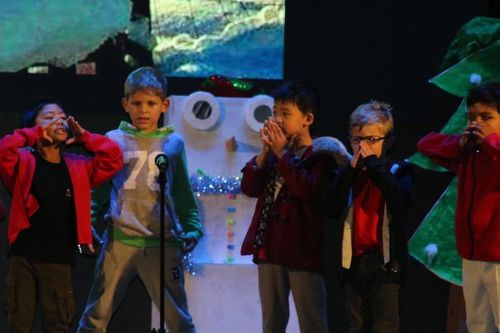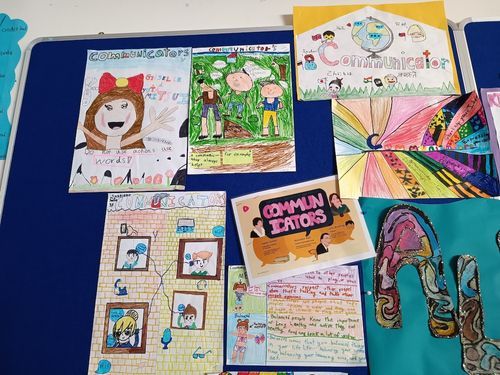It’s never too early to spark a child’s creativity. Especially during their early years, engaging in imaginative play facilitates learning for all children. Role-playing, acting out their thoughts and coming up with imaginary scenarios help young children make sense of the world around them. At One World International School, we encourage our youngest learners to engage in dramatic play. A key component of our early childhood education, creative drama provides structure and support to help children use their experiences to build on what they already know.
Drama: An Outlet for Expression
Creative drama provides an outlet for young children to express their thoughts, wishes and emotions. It challenges children’s perceptions of their world and themselves. Acting out imaginary roles and situations encourages them to think critically and creatively. By pretending to take on the role of parent or teacher, children learn to understand others’ perspectives and behaviour.
Drama helps children manage their emotions, too. Looking at the world from another’s point of view in role-playing activities instils tolerance and empathy. Creative expression enables young learners to grasp the consequences of their actions, practise appropriate behaviour and respond constructively to conflict.
Imaginative play also gives students a sense of agency and motivates them to be creative while making connections to what they’re learning in the classroom. As they take on new roles, children experiment by coming up with different problems and solutions faced by literature characters. In our Early Childhood programme, drama provides a safe, supportive learning environment where children can make decisions and explore new possibilities. They can examine, discuss and even experience various actions and consequences without threat.

Skills Developed
The importance of creative expression is sometimes overlooked. However it cultivates critical skills in young children and hence we incorporate it in our Early childhood curriculum. During these formative years, drama is:
- Communication. Drama sets the stage for children to understand people in new ways and communicate their insights to others. Children who participate in drama-oriented activities are especially likely to be persuasive communicators, both verbally and in writing. Creative drama improves children’s self-image, making them more confident public speakers who can easily relate to their audience.
- Collaboration. Drama gives children a foundation in the skills necessary to thrive in an increasingly team-oriented world. Role-playing requires children to work harmoniously together to find the best way for each member of the group to be involved. In these activities, young learners must listen to and accept others’ viewpoints and contributions.
- Active Learning. Participating in dramatic activities requires self-control and discipline, which impact so many other areas of learning. Creative expression incorporates art, music and movement. Role-playing helps students make connections between topics, as History, Science, and other subjects come alive for them. Creative interaction nurtures every aspect of children’s development, cultivating kinesthetic and empathetic awareness, along with a deeper intellectual understanding of events happening in their young lives.
How We Encourage Creative Expression in the Early Years at OWIS
At OWIS, we use drama to get our youngest learners immersed and engaged in their learning. Creative expression enhances students’ skills in literacy, numeracy and more. Here are a few of the many ways we incorporate role-playing and other forms of creative expression into our early years curriculum.
Our early childhood students participate in fun activities such as finger play, depicting the water cycle and acting out animal movement. Creative movement sharpens spatial awareness and makes learning more meaningful.
Through songs and music, students learn about numbers, poetry and recitations. Theatrical techniques help students understand new concepts. For instance, we often use simple props when telling stories or depicting characters in literature. We illustrate various concepts through miming, puppetry and role-playing activities to make learning more relatable to early learners.

Another way we get our early childhood students excited about learning is through “small-world play.” Our Early Childhood (EC) classrooms have dedicated learning spaces and play spaces where children can play with sand, clay, water, miniature animals and other objects. In collaboration with their peers, they are entirely free to let their imaginations run wild. Here, they have boundless opportunities to cultivate their creativity while mastering the nuances of teamwork — taking turns, resolving conflict, communicating their thoughts and listening to others’ opinions. Participating in these creative interactions develops open-mindedness, respect and tolerance — traits that are essential for successfully living and working with others.
Regular assemblies throughout the year give our EC students opportunities to gain skills and self-awareness through speaking, singing, dancing and acting. Additionally, every December, we have an Early Childhood Production in which our EC students act out a storyline. Each child plays an active part through speaking, singing, dancing and other forms of artistic expression.
At OWIS, creative expression is central to our Performing Arts curriculum. Drama helps our early childhood students learn more about themselves and the larger world in a fun, nurturing environment. To inquire about our early years program, visit us virtually today.
(All OWIS photographs in this blog article were taken pre-Covid. The school is adhering to hygiene protocols and social distancing measures as recommended by the CPE and Ministry of Health, Singapore.)















